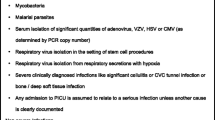Abstract
Background
Procalcitonin (PCT) was widely investigated in febrile neutropenia as an indirect marker of infection. Many institutions also use PCT as a tool to monitor the course of a febrile episode because increases in PCT values during the febrile episode were associated with development of complications. However, to date, no study systematically evaluated the accuracy of decreasing PCT values in predicting favorable outcomes of a febrile episode. The aim of this study was to evaluate the changes in PCT values after resolution of fever with regard to their predictive value of stable defervescence.
Materials and methods
PCT was studied prospectively in 94 febrile episodes of 35 patients with hematological malignancies.
Results
Sixty-seven episodes were associated with an increased level of PCT at the beginning. In these episodes, stable resolution of fever was significantly correlated with a decrease in PCT values. The best cut-off level to predict freedom from recurrence of fever for at least 5 days was <70% of the maximum PCT value on the second afebrile day. Out of 44 patient episodes with a subsequent decrease to <70%, only two patients had recurrent fever within the next 5 days, revealing a negative predictive value of 95%, p<0.001.
Conclusion
Our study supports the value of PCT as a reliable tool to predict clinical outcome in febrile neutropenia.

Similar content being viewed by others
References
Barnes C, Ignjatovic V, Newall F, Carlin J, Ng F, Hamilton S, Ashley D, Waters K, Monagle P (2002) Change in serum procalcitonin (deltaPCT) predicts the clinical outcome of children admitted with febrile neutropenia. Br J Haematol 118:1197–1198
Bernard L, Ferriere F, Casassus P, Malas F, Leveque S, Guillevin L, Lortholary O (1998) Procalcitonin as an early marker of bacterial infection in severely neutropenic febrile adults. Clin Infect Dis 27:914–915
Christ-Crain M, Jaccard-Stolz D, Bingisser R, Gencay MM, Huber PR, Tamm M, Muller B (2004) Effect of procalcitonin-guided treatment on antibiotic use and outcome in lower respiratory tract infections: cluster-randomised, single-blinded intervention trial. Lancet 363:600–607
Donowitz GR, Maki DG, Crnich CJ, Pappas PG, Rolston KV (2001) Infections in the neutropenic patient—new views of an old problem. Hematology (Am Soc Hematol Educ Program) 113–139
Engel A, Steinbach G, Kern P, Kern WV (1999) Diagnostic value of procalcitonin serum levels in neutropenic patients with fever: comparison with interleukin-8. Scand J Infect Dis 31:185–189
Fleischhack G, Kambeck I, Cipic D, Hasan C, Bode U (2000) Procalcitonin in paediatric cancer patients: its diagnostic relevance is superior to that of C-reactive protein, interleukin 6, interleukin 8, soluble interleukin 2 receptor and soluble tumour necrosis factor receptor II. Br J Haematol 111:1093–1102
Giamarellos-Bourboulis EJ, Grecka P, Poulakou G, Anargyrou K, Katsilambros N, Giamarellou H (2001) Assessment of procalcitonin as a diagnostic marker of underlying infection in patients with febrile neutropenia. Clin Infect Dis 32:1718–1725
Giamarellou H, Giamarellos-Bourboulis EJ, Repoussis P, Galani L, Anagnostopoulos N, Grecka P, Lubos D, Aoun M, Athanassiou K, Bouza E, Devigili E, Krcmery V, Menichetti F, Panaretou E, Papageorgiou E, Plachouras D (2004) Potential use of procalcitonin as a diagnostic criterion in febrile neutropenia: experience from a multicentre study. Clin Microbiol Infect 10:628–633
Hambach L, Eder M, Dammann E, Schrauder A, Sykora KW, Dieterich C, Kirschner P, Novotny J, Ganser A, Hertenstein B (2002) Diagnostic value of procalcitonin serum levels in comparison with C-reactive protein in allogeneic stem cell transplantation. Haematologica 87:643–651
Hughes WT, Armstrong D, Bodey GP, Bow EJ, Brown AE, Calandra T, Feld R, Pizzo PA, Rolston KV, Shenep JL, Young LS (2002) 2002 guidelines for the use of antimicrobial agents in neutropenic patients with cancer. Clin Infect Dis 34:730–751
Jimeno A, Garcia-Velasco A, del Val O, Gonzalez-Billalabeitia E, Hernando S, Hernandez R, Sanchez-Munoz A, Lopez-Martin A, Duran I, Robles L, Cortes-Funes H, Paz-Ares L (2004) Assessment of procalcitonin as a diagnostic and prognostic marker in patients with solid tumors and febrile neutropenia. Cancer 100:2462–2469
Kallio R, Surcel HM, Bloigu A, Syrjala H (2000) C-reactive protein, procalcitonin and interleukin-8 in the primary diagnosis of infections in cancer patients. Eur J Cancer 36:889–894
Link H, Bohme A, Cornely OA, Hoffken K, Kellner O, Kern WV, Mahlberg R, Maschmeyer G, Nowrousian MR, Ostermann H, Ruhnke M, Sezer O, Schiel X, Wilhelm M, Auner HW (2003) Antimicrobial therapy of unexplained fever in neutropenic patients-guidelines of the Infectious Diseases Working Party (AGIHO) of the German Society of Hematology and Oncology (DGHO), Study Group Interventional Therapy of Unexplained Fever, Arbeitsgemeinschaft Supportivmassnahmen in der Onkologie (ASO) of the Deutsche Krebsgesellschaft (DKG-German Cancer Society). Ann Hematol 82:S105–S117
Ortega M, Rovira M, Filella X, Almela M, Puig de la Bellacasa J, Carreras E, Mensa J (2004) Prospective evaluation of procalcitonin in adults with febrile neutropenia after haematopoietic stem cell transplantation. Br J Haematol 126:372–376
Persson L, Engervall P, Magnuson A, Vikerfors T, Soderquist B, Hansson LO, Tidefelt U (2004) Use of inflammatory markers for early detection of bacteraemia in patients with febrile neutropenia. Scand J Infect Dis 36:365–371
Persson L, Soderquist B, Engervall P, Vikerfors T, Hansson LO, Tidefelt U (2005) Assessment of systemic inflammation markers to differentiate a stable from a deteriorating clinical course in patients with febrile neutropenia. Eur J Haematol 74:297–303
Ruokonen E, Nousiainen T, Pulkki K, Takala J (1999) Procalcitonin concentrations in patients with neutropenic fever. Eur J Clin Microbiol Infect Dis 18:283–285
Svaldi M, Hirber J, Lanthaler AI, Mayr O, Faes S, Peer E, Mitterer M (2001) Procalcitonin-reduced sensitivity and specificity in heavily leucopenic and immunosuppressed patients. Br J Haematol 115:53–57
Uys A, Rapoport BL, Anderson R (2004) Febrile neutropenia: a prospective study to validate the Multinational Association of Supportive Care of Cancer (MASCC) risk-index score. Support Care Cancer 12:555–560
von Lilienfeld-Toal M, Dietrich MP, Glasmacher A, Lehmann L, Breig P, Hahn C, Schmidt-Wolf IG, Marklein G, Schroeder S, Stuber F (2004) Markers of bacteremia in febrile neutropenic patients with hematological malignancies: procalcitonin and IL-6 are more reliable than C-reactive protein. Eur J Clin Microbiol Infect Dis 23:539–544
Zweig MH, Campbell G (1993) Receiver-operating characteristic (ROC) plots: a fundamental evaluation tool in clinical medicine. Clin Chem 39:561–577
Acknowledgements
This study was supported by the Leukaemie-Initiative Bonn. M. von Lilienfeld-Toal is supported by a grant from BonFor, University of Bonn. We thank Makbule Kobilay for excellent technical assistance and Samuel Ackroyd for critical reading of the manuscript.
Author information
Authors and Affiliations
Corresponding author
Rights and permissions
About this article
Cite this article
von Lilienfeld-Toal, M., Schneider, A., Orlopp, K. et al. Change of procalcitonin predicts clinical outcome of febrile episodes in patients with hematological malignancies. Support Care Cancer 14, 1241–1245 (2006). https://doi.org/10.1007/s00520-006-0081-2
Received:
Accepted:
Published:
Issue Date:
DOI: https://doi.org/10.1007/s00520-006-0081-2




